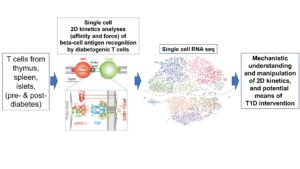On the Plasticity of Beta-cell Antigen Recognition by Diabetogenic CD8 T cells
Contact PI: Baoyu Liu, PhD, University of Utah (R03 DK129982)
Start Date: July 1, 2021
Start Date: June 30, 2023
NIH HIRN Gateway Investigator Award Recipient
Abstract
CD8 T cells play an essential role in T1D pathogenesis. They comprise the most abundant immune cell population in patient islet infiltrates. In the non-obese diabetic (NOD) model of T1D, they are required for diabetes development. The infiltration and retention of autoreactive T cells in islets is strictly dependent on specific recognition of beta-cell antigens. Such self-recognition also determines diabetogenic CD8 T cell’s cytotoxicity and ultimate killing of beta-cells. However, little is known about how CD8+ T cells recognize beta-cell antigens. Over the past decade, we have used novel 2D assays to characterize T cell antigen recognition in general, revealing 2D affinity and mechanical force as two defining kinetics parameters in determining T cell responses. In the current proposal, we will apply these 2D methods to beta-cell antigen recognition by autoimmune CD8 T cells and elucidate the underlying molecular mechanisms by single cell RNA sequencing. Our preliminary data show that diabetogenic CD8 T cells can greatly change affinity and/or force of self-antigen recognition depending on T cell maturation, activation, and disease status. We propose two specific aims to test a central hypothesis that diabetogenic CD8 T cells bind to beta-cell self-antigens weakly to evade tolerance mechanisms but can upregulate bond strength to drive disease. In Specific Aim 1, we will use our 2D methods to characterize affinity and force of beta-cell antigen recognition by CD8 T cells throughout the course of diabetes. In Specific Aim 2, we will use single cell transcriptome analysis to elucidate molecular mechanisms that abnormally regulate beta-cell self-antigen recognition. The project will generate critical yet currently missing information on beta-cell self-antigen recognition and inform novel intervention strategies that are capable of specifically targeting diabetogenic CD8 T cells.


